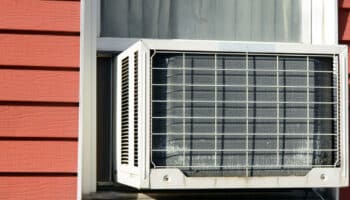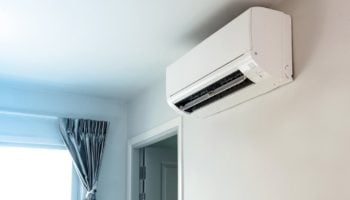We've independently reviewed this article to make sure it's as accurate as we can make it.
To find out more about our article creation and review process, check out our editorial guidelines.
Finding a puddle of water under your air conditioner can be alarming.
It’s important to act quickly to figure out the cause of your leaking AC unit and prevent future damage. With the proper tools and knowledge, you can narrow down the cause of the leakage and get your AC back to working order.
In this article, we’ll cover:
- Reasons why your AC is leaking
- How to fix common causes of leakage
- Whether a leaking AC unit is dangerous
- Whether you can use a leaking AC unit
Ready to learn more? Then let’s dive in.
Why Your AC’s Leaking (And How to Fix It)
There are all sorts of things that can cause an air conditioner to leak water. Air conditioners pull water vapor from the air and turn it into liquid. The water then travels through a drain line that leads out of your house. If any component of the air conditioning system is clogged or damaged, the water will leak. Before you fix your AC, you’ll need to determine the cause of the leakage.
This video is a good explanation of how to identify and fix some basic causes of leaking AC units:
The most common cause of leakage is a clogged condensate drain line. If you’ve been neglecting regular maintenance, it’s also possible that your AC is leaking because dirt has built up in its coils. Other possible causes of leakage are a disconnected condensate drain line, a broken condensate pump, an overflowing drain pan, a bad circulating fan, or low refrigerant (which causes the evaporator to ice up and overwhelm the drainage system),
Clogged Condensate Drain Line
The most common reason for a leaking air conditioner is a clogged condensate drain line. To understand why this is an issue, you’ll need to know how air conditioners work — here’s a quick rundown.
Air conditioners work by removing water vapor from the air. The water vapor cools into water, and then collects on a part of the air conditioner called the evaporator coil. This water then flows into a drain pan and down a condensate drain line, which leads outside.
The drain line can easily get clogged up with dirt, dust or other debris. If this happens, the water will get backed up and can leak out of the air conditioner.
If you have a newer air conditioner, you’re in luck — newer units often have a sensor that will let you know that the drain line is clogged. If you aren’t sure whether there’s a clog, check your AC’s drain pans (systems typically have two – a primary and secondary drain pans). The secondary is the one you can see without removing any doors.
If you see water or evidence of past water in your secondary drain pan, then you have a problem. Most of these secondary pans have a float switch that turns off the AC when the pan gets full.
How to Unclog a Condensate Drain Line
If you have a clogged drain line on your hands, there’s no shame in calling in the pros. If you want to take a stab at it yourself, here’s how to do it:
- Begin by turning off the power to your AC. To be safe, shut off the breaker as well.
- Locate the drain line.
- Push a thin brush into the end of the drain line to clear out whatever blockages you can reach.
- To clear out blockages further down the drain line, you’ll need to use a wet/dry vacuum.
- Find the vent tee, a fitting that attaches the condensation tray to the drain. Remove the cap from the vent tee and pour a mix of one part bleach to one part water into the drain.
- Wait 30 minutes, and then pour water through the drain line.
- Place a bucket under the other end of the drain line and wait for water to drain out. If water drains out, good news—the blockage is cleared! However for some newer systems, there’s also a clean out which is lifted between the trap and the coil. You can try your brush and flush again here.
Dealing with Dirty Coils
Another common cause of leakage is dirty evaporator coils. If you haven’t gotten your air conditioner cleaned in a while, it’s likely that dust and dirt have built up. As a general rule of thumb, it’s a good idea to get maintenance done on your AC every year.
If the coils are dirty, the condensate will not be able to flow through the drain line. Instead, the water will drip off the coil and onto your floor. A telltale sign that the leak is due to dirty coils is that the water is falling in small drips, as opposed to large leaks.
How to clean your AC coils:
- Before you begin, make sure to turn off the air conditioner. To take additional precautions, turn off your circuit breaker.
- Unscrew the access panel from your indoor AC unit.
- If you only have a small amount of dirt to deal with, you can use a brush to clean off the coils. Use a soft brush to gently sweep dirt off the coils, being careful not to damage the fins.
- Another option if you have minimal dirt buildup is to use compressed air to blow dirt off the evaporator coil. Blow the compressed air in the opposite direction to which air normally blows along the coil.
- If you have a larger amount of build up, pop to any big box hardware store and look for an ‘Evaporator Coil Cleaner’ in their air conditioner section (note – NOT a condenser coil cleaner). You can then follow the product’s instructions to clean the AC coils. Condenser coil cleaners are for outside units only.
Disconnected condensate drain line
Your AC may also be leaking because of faulty installation. If your condensate drain line wasn’t installed correctly, it can come undone. Any vibrations in the home or other disturbances will cause the drain line to come out of its socket, which will cause water leakage.
How to Fix a Disconnected Drain Line
Unfortunately, this is a result of faulty installation, and you’ll need to have the pros come back to reconnect the drain line.
Thawing a Frozen Coil
A leaking AC may be a sign of a frozen evaporator coil, which is a much more serious problem. If frost or ice builds up on the evaporator coil, this will ruin the compressor over time. This is a pricey repair, and you may end up having to replace the entire unit.
How to Deal with a Frozen Coil
If you notice that your AC is leaking, turn it off and investigate immediately. If you see ice, you’ll need to act quickly. This is a repair best left to the pros, so call them in right away.
To prevent your evaporator coils from freezing again, change the air filters on your AC once every one to two months. If the air filter is clogged, the air will be restricted, which can cause the coils to freeze.
Damaged Drain Pan
If your air conditioner’s drain pan is damaged or rusted, the water will leak right through. The drain pan collects water that builds up on the evaporator coil. If the drain pan is damaged, it won’t be able to hold water.
How to Deal with a Damaged Drain Pan
If you have an older air conditioner, a damaged drain pan is a likely cause of leakage. Luckily, this is an easy fix. All you need to do is buy a new drain pan and replace it yourself.
If you want to get any replacement part – or see how much one would cost – click to enter your model number in the search bar below. Our partners at AppliancePartsPros stock almost every part with free guides on how to install them.

Broken Condensate Pump
If your leaking AC unit is installed in the basement, there’s likely a condensate pump which pushes the water outside. If the pump breaks, the water will have nowhere to go and will leak inside your house.
How to Deal with a Broken Condensate Pump
First off, we want to check the pump’s plug. Many building codes require some basement areas to have a special plug called a GFI that has it’s own trip button (often red). Check this to make sure it didn’t trip.
Otherwise, you can check the pump yourself. Locate the pump and look for blockages or loose wires. If you don’t see any physical signs of damage, you can use a meter to determine if the pump is working properly. If it turns out that your pump is broken, you’ll need to call in the pros to repair or replace it.
Fixing a Leaking Window or Portable Air Conditioner
If you have a window or portable air conditioner, an overflowing drain pan is the most likely cause of the leak. Drain pans fill up naturally as your air conditioner runs, and all you have to do is empty it out.
Pay extra attention to your drain pan when it rains outside. When it’s raining, water will evaporate less than usual, which can cause your AC to leak more.
While a full drain pan is the most likely possibility, there’s also a chance that the window air conditioner isn’t sealed properly. The warm outside air will be condensed in the AC, which will create extra moisture in the air conditioner and cause water to leak.
Check the seal on your window air conditioner if you notice that it’s leaking more than usual. You can use rope caulk or adhesive-backed foam weatherstripping to reseal the gaps yourself.
Is A Leaking Air Conditioner Dangerous?
If water is all that’s leaking from your air conditioner, it’s not dangerous. Most of the time, leaking water is a result of a blockage or dirt buildup in the AC unit. While this isn’t dangerous, it’s a hassle and could be an expensive repair.
If the refrigerant (typically a gas) is leaking from your air conditioner, then it’s cause for concern – but it’s also not dangerous to your health. Refrigerant leaks in a home-sized air conditioner is unlikely to be in a concentration to cause any harm. This may change in future, as we’re moving towards using refrigerants where are more flammable.
Some signs that your AC is leaking refrigerant:
- Your electrical bill is higher than usual
- The house doesn’t cool down as quickly as usual
- The AC is blowing warm air
- Ice has built up on the AC unit
Can You Use a Leaking AC Unit?
To figure out whether it’s okay to use your air conditioner while it’s leaking, you first need to determine the cause of the leak.
If refrigerant is leaking, turn your air conditioner off immediately. Refrigerant leaks can be dangerous, and continuing to use it can also cause damage to the AC.
If your air conditioner is leaking because the evaporator coils are frozen, you shouldn’t turn it on until the problem is fixed. Continuing to use the air conditioner while the coil is frozen can badly damage the unit.
Assuming that the leak is caused by blockage or dirt buildup, you should be okay to keep using it. Keep a bucket below the leaking AC unit and continue to monitor your AC for any other signs of damage. While it’s safe to keep using your air conditioner, you should clear out the blockage as soon as possible so that it doesn’t get worse.
How Much Does It Cost to Unclog a Drain Line?
The typical range to snake a drain line is $135 to $300, at an average of $220. The bill might be higher if there’s a stubborn clog or a damaged part that needs repair. If this is the case and the evaporator coil needs to be replaced, it could put you anywhere from $400 to $950.
Conclusion
Leaking air conditioners are a serious problem. Not only can they leave you hot and uncomfortable all summer, they can also lead to serious water damage and mold problems in the long run.
Luckily, most AC unit leaks are easy fixes. Keeping your air conditioner clean and well-maintained will help prevent and repair most leaks. When that’s not enough, you can call the professionals and they’ll be able to help.
I hope this article has cleared up your questions about leaking AC units. If this article has helped you, why not consider supporting us by checking out our related articles?
Thanks for reading, and have a great day!
-Craig







